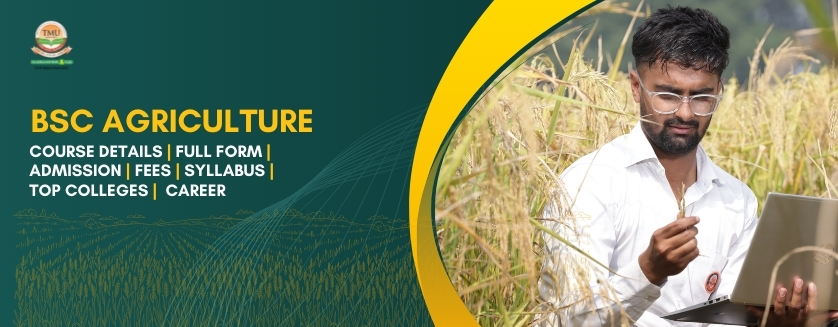BSc Agriculture Course Details, Full Form, Admission, Fees, Syllabus, Top Colleges, Career
Table of Contents
BSc Agriculture is a 4-year undergraduate degree program that focuses on the scientific study of agricultural science and technology. The course provides a deep understanding of plants, animals, plant breeding, soil science and animal husbandry. It combines both theoretical knowledge and practical training to equip candidates with scientific knowledge related to modern farming.
The program will provide students with practical experience in the form of field visits, laboratory courses, internships, and research work. Graduates with a BSc in agriculture are prepared for a career in various sectors like research, government sectors and sustainable agriculture. It is the best choice for those who are fond of nature, food production and contributing to the development of the agriculture sector.
If you are also dreaming of a career in agricultural science, you just have to complete your 10+2 with Physics, Chemistry, and Biology and start your career. Through this article, we’ll explore all about the agriculture course details, eligibility criteria, admission process, fees, top colleges, subjects & syllabus and Specialisations.
Full Form of BSc Agriculture
Full form of BSc Agriculture is Bachelor of Science in Agriculture. It is a 4-year undergraduate degree program, divided into 8 semesters. The course provides knowledge on the modernisation of farming, agricultural science and technology. Along with the classroom teaching, this course involves practical training and research work.
Teerthanker Mahaveer University
Apply for Admission
Click Here To Apply for Admission
BSc Agriculture Course Overview
| Particulars | Details |
| Course Name | Bachelor of Science in Agriculture (BSc Agriculture) |
| Course Level | Undergraduate |
| Course Duration | 4 Years (8 Semesters) |
| Eligibility | 10+2 (Intermediate) with Physics, Chemistry, Biology/Mathematics from a recognised board |
| Minimum Marks Required | 50–55% aggregate in qualifying examination (varies by university) |
| Admission Process | Merit-based or through entrance exams |
| Course Type | Full-time |
| Average Fee (per year) | ₹60,000 – ₹1,20,000 (varies by institution) |
| Core Subjects | Agronomy, Horticulture, Soil Science, Agricultural Economics, Plant Breeding, Entomology, Plant Pathology |
| Training Components | Fieldwork, Laboratory Practicals, RAWE, Internships |
| Career Options | Agricultural Officer, Agronomist, Farm Manager, Soil Scientist, Horticulturist, Agri-Entrepreneur |
| Higher Studies Options | MSc Agriculture, MBA Agri-Business Management, PhD. Agriculture |
| Top Recruiters | ICAR, NABARD, FCI, Krishi Vigyan Kendra, Private Agri-companies, Seed & Fertiliser Firms |
| Average Starting Salary | ₹3.5 – ₹6 LPA |
BSc Agriculture Course Syllabus
Here’s a semester-wise overview of the BSc Agriculture Course:
| Semester | Subjects / Topics Covered |
| Semester 1 |
|
| Semester 2 |
|
| Semester 3 |
|
| Semester 4 |
|
| Semester 5 |
|
| Semester 6 |
|
| Semester 7 |
|
| Semester 8 |
|
Eligibility Criteria for BSc Agriculture
In order to study BSc Agriculture, you have to meet some of the academic and age requirements as provided by the university or agricultural institutions:
- Educational Qualification: An intermediate (10+2) or its equivalent form of a recognised board needs to have been completed.
- Core Subjects: Some of the core subjects that you should have studied include Physics, Chemistry and Biology/Mathematics/Agriculture.
- Marks: You must normally have at least 50-55 per cent in aggregate marks in such subjects (relaxation can be given on the reserved categories).
- Entrance Exam: The admissions can be based on merit (on your 12th-grade marks) or through an entrance exam.
Entrance Exam for BSc Agriculture
| Exam Name | Conducting Body | Level | Subjects Covered |
| ICAR AIEEA (All India Entrance Examination for Admission) | National Testing Agency (NTA) | National | Physics, Chemistry, Biology/Mathematics/Agriculture |
| MHT CET | State CET Cell, Maharashtra | State | Physics, Chemistry, Biology/Maths |
| KEAM | Commissioner of Entrance Exams, Kerala | State | Physics, Chemistry, Biology |
| AP EAMCET / TS EAMCET | JNTU | State | Physics, Chemistry, Biology/Maths |
| BCECE | Bihar Combined Entrance Board | State | Physics, Chemistry, Biology/Agriculture |
| CG PAT | Chhattisgarh Professional Examination Board | State | Agriculture, Biology, Chemistry |
| KCET | Karnataka Examinations Authority | State | Physics, Chemistry, Biology |
| TMU Entrance / Merit-Based Admission | Teerthanker Mahaveer University | University | Based on Class 12 Marks / Interview |
Admission Process of BSc Agriculture
The admission process of BSc Agriculture includes:
Check Eligibiliy
- To apply for the course, you have to complete intermediate with at least 50-55 per cent in aggregate marks.
- You have passed 12 with core subjects including Physics, Chemistry and Biology/Mathematics.
Select a college
- If you meet the criteria, you have to select a college or university.
- You can make your prioritising list, including college reputation, fee structure, and placement records.
Application form
- After choosing the college, you can apply online through the university’s website.
- If required, you can also apply offline by visiting the admission centre.
Required Documents
- Masksheets
- Photograph
- Certificates
- Personal details
- Supporting documents
Entrance Exam ( If Applicable)
- If required, you have to qualify for the entrance exam.
- Some universities consider scores from national or state-level entrance exams.
- Agricultural exams mainly include: CUET (ICAR-UG), UPCATET and MHT CET Agriculture.
Merit List
- Admissions are normally based on merit.
- Universities publish their merit list and grant admission to students according to merit.
Counselling/Personal Interview
- Selected candidates get a call for counselling and a personal interview.
- Universities conduct these interviews to assess your ability.
Final Admission & Fee payment
- After the completion of the interview session, you have to submit all your documents again to verify.
- Pay the admission fee and confirm your seat.
BSc Agriculture Course Fees
| Type of College | Annual Fee Estimate / Total 4-Year Course |
| Government / State-Agricultural Universities | ~ ₹10,000 – ₹50,000/year; ₹40,000 – ₹2,00,000 for full 4 years. |
| Private / Deemed Universities | ~ ₹50,000 – ₹2,00,000/year; ₹2,00,000 – ₹8,00,000+ for full course depending on prestige & facilities. |
Career Opportunities After BSc Agriculture
B.Sc. Agriculture is a valuable study as food security and sustainable agricultural activities are highly in demand globally, which creates an extensive variety of career opportunities in the government or private sectors. Here's a short breakdown, why BSc Agriculture is beneficial:
Diverse Career in the Private Sector
The private sector opens doors to many opportunities for a BSc Agriculture graduate. The private sector provides opportunities in agribusiness, agri-tech, food processing and farm management. There are also prospects in food processing, supply chain management, seed research, and agricultural finance, by using the private banks and microfinance institutions. Many companies hire agriculture graduates as Sales and Marketing Executives to sell agri-inputs, such as seeds, fertilisers, and pesticides, to bridge the research innovations and farmers.
Opportunities in Government Sector
A BSc Agriculture opens career opportunities in diverse government sectors. Agriculture graduates can work in various government Agriculture departments such as NABARD, FCI, ICAR and Krishi Vigyan Kendras (KVKs). An Agricultural Officer is one of the most wanted jobs in agriculture graduates. They serve in state departments as they execute agricultural programs, help farmers in managing their crops, pest control, and the adoption of new technology.
Higher Education Opportunities
After completing a BSc Agriculture, candidates can also pursue higher studies like MSc Agriculture and PhD. After completing a BSc Agriculture, candidates have several options for advanced studies that can assist them to specialise. Candidates can also pursue an MBA in Agribusiness to get deep knowledge of the business and management side of agriculture. It integrates management, finance, and agriculture training to enable students to be leaders in Agribusiness firms, Marketing boards of agricultural products and Export companies.
Entrepreneurship
BSc Agriculture not only prepares students for private and government sector jobs, but also gives them a chance to become entrepreneurs. After having a solid understanding of agricultural science, farm management and agribusiness, graduates can be self-employed professionals. It is also possible for them to develop their own business in organic farming, agri-consultancy, food processing or nursery development. Agricultural entrepreneurship allows the graduates of BSc Agriculture to use their knowledge in a new way and become a factor in food security.
Top BSc Agriculture Colleges
| College / University | Location | Highlight |
| Institute of Agricultural Sciences, BHU, Varanasi | Varanasi, UP | Big farm facilities, strong research in crops & soil. |
| Anand Agricultural University | Gujarat | Govt agriculture university, multiple campuses, good reach in agrarian districts. |
| Teerthanker Mahaveer University (TMU) | Moradabad, UP | ICAR-accredited agriculture program, good practical exposure and modern labs. (TMU) |
| Sardarkrushinagar Dantiwada Agricultural University | Palanpur, Gujarat | Strong govt agricultural institution, good in regional crop research & allied sciences. |
| University of Mumbai | Mumbai, Maharashtra | Not found: no clear government agriculture college under the University of Mumbai of strong repute. |
TMU – Where Agriculture Meets Excellence
Teerthankar Mahaveer University stands out as the leading institution for agricultural education. The University provides an ideal combination of advanced technology and science. TMU’s College of Agriculture Sciences has been accredited by the Indian Council of Agricultural Research (ICAR). The curriculum of the university provides students with the opportunity to look beyond becoming agricultural professionals. Here are some key reasons why TMU stands out as a top university for agricultural education:
- Faculty and Learning Environment: TMU’s agricultural department has highly qualified faculty, holds advanced degrees like MSc or PhD, and many have research and industry exposure. The University focuses on small classes and individual consideration to r to promote a nurturing learning experience.
- Infrastructure and Facilities: TMU has modern facilities and infrastructure to equip candidates with advanced knowledge and practical skills through modern classes and updated labs. The university provides hands-on experience through its modern greenhouse and farm.
- Practical Training: Along with theoretical knowledge, the university provides practical training through agricultural fields and modern labs. Every semester will consist of field trips and practical work. The students are not learning the theory only; they put what they learn into practice when they are planting crops, testing the soils, treating the seeds, etc.
- Career Opportunities: The university has strong tie-ups with agricultural industries, which offer students good internship and placement opportunities. After completing BSc Agriculture at TMU, graduates will be ready to work in the areas of agri-business, research, government services and fertiliser firms.
Conclusion
Bachelor of Science in Agriculture (B.Sc. Agriculture) has a great and sustainable future. This course is considered the best undergraduate degree for those who are interested in new technologies in modern agriculture, food security, and the development of agriculture. The course provides opportunities in government offices and research institutions, along with agribusiness, food production, and entrepreneurship
FAQ
Q1. Is a BSc Agriculture a good career?
Ans. Yes, BSc Agriculture is the best option for those who are interested in plants and agriculture. Due to the increasing demand for agricultural professionals, the course opens doors to a wide range of opportunities.
Q2. How to do a BSc Agriculture after 12th?
Ans. If you have completed your 10+2 in Physics, Chemistry and Biology with a minimum of 50% marks, then you are eligible to apply for the BSc Agriculture degree.
Q3. Which job is the best after a BSc in agriculture?
Ans. The best job after a BSc Agriculture depends on your interest and career goals. You can either work in the government sector or in the private sector.
Q4. Does agriculture have a future?
Ans. Absolutely, agriculture has a strong future, as the demand for agricultural products is also increasing. This has rendered agriculture one of the most fundamental and stable industries across the globe.
This content gives an overview of the programme and is for educational purposes only. For updated admission guidelines and counselling support, please connect with our Counsellor Team.














